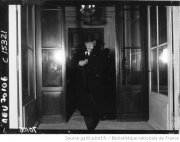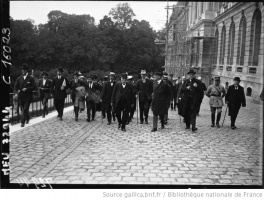Life and Political Career↑
Son of a Jewish banker from Livorno and a British mother, Sidney Sonnino (1847-1922) was raised as an Anglican and learned English as his first language. He completed a law degree in Pisa in 1865 and from 1866 to 1871 was part of the diplomatic corps. During the 1870s he was known for his defense of universal male suffrage and for the investigative report La Sicilia nel 1876, a milestone in the debate about the Southern Question.
Sonnino was elected a member of parliament in 1880 and pursued a policy of critical distance from both of the traditional Italian coalitions, the Right and the Left. As the Finance Minister in the fourth Crispi government (1893-1896), Sonnino initiated a fundamental restructuring of the Italian banking system. In the first decades of the 1900s, Sonnino led the parliamentary opposition against the most important politician of the period, Giovanni Giolitti (1842-1928). He was also Prime Minister for two short periods in 1906 and 1910. After having served as Minister of Foreign Affairs during World War I, Sonnino left politics.
Treaty of London↑
Sidney Sonnino was appointed Minister of Foreign Affairs in the second Antonio Salandra (1853-1931) government on 5 November 1914. His appointment followed the death of Antonino di San Giuliano (1852-1914), who as Minister of Foreign Affairs had advocated Italian neutrality. Although historically a supporter of the Triple Alliance, Sonnino was increasingly convinced that by siding with the Triple Entente, Italy could become a great power. He therefore concluded the negotiations with Great Britain and France which San Giuliano had begun, and signed the Treaty of London on 26 April 1915. Under this pact, Italy agreed to enter the war as an ally of the Entente and in return was guaranteed the territories of Trentino, South Tyrol, Julian Venetia, Istria with the exception of Fiume, a part of Dalmatia, a number of islands in the Adriatic and Vlorë and Sazan in Albania. Italy’s control of Libya and the Dodecanese was also guaranteed. The Treaty thus not only provided definite borders with the Hapsburg Empire and the completion of the unity of Italy, but also confirmed Italy’s colonial conquests and offered further expansion, in particular in the Balkans.
The War and Relationships with the Triple Entente↑
On 24 May 1915, Italy declared war on the Hapsburg Empire. Its failure to declare war on Germany as well complicated relations within the Entente. It was a decision taken primarily by Salandra but supported for a number of reasons by Sonnino himself, who worked to calm the fears of Great Britain and France. For example, he managed to convince the Italian government to declare war on Turkey on 20 August 1915, despite Salandra’s strong opposition.
In June 1916, immediately after Italy’s defeat by the Austrians (Strafexpedition) and the consequent fall of the Salandra government, Sonnino was confirmed as Minister of Foreign Affairs in the new government led by Paolo Boselli (1838-1932). Bolstered in his role and ever more convinced that Italy should fully comply with the commitments made to the Triple Entente, Sonnino managed to convince the government to declare war on Germany on 27 August 1916. All the same, disagreements with Great Britain and France about the future division of the Anatolian Peninsula led Sonnino to be increasingly inflexible in his dealings with the Entente allies.
After the defeat at the Battle of Caporetto in October 1917 and the fall of the Boselli government, Sonnino was again confirmed as Minister of Foreign Affairs in the new government led by Vittorio Emanuele Orlando (1860-1952). Sonnino’s influence diminished, however, as Orlando increasingly took the lead in foreign policy. Moreover, Sonnino remained firm in his unbending defense of the Treaty of London and was unable to adapt his political approach to the profound changes brought about by the Russian Revolution and the entry of the United States into the war.
The Paris Peace Conference↑
The viewpoints of Sonnino and the U.S. President Woodrow Wilson (1856-1924) were evidently in stark contrast. Wilson was generally in favor of each nation affirming itself and in particular supported the new Kingdom of Serbs, Croats and Slovenes. The interests of this kingdom and Italy were clearly divergent. Great Britain and France were for their part intent on limiting Italy’s authority in the Balkans as well as excluding it from a share of the ex-German colonies and especially from the territories of the ex-Ottoman Empire.
Matters were complicated by conflicts between Sonnino and Italian Prime Minister Orlando. The latter was on the one hand receptive to Slavic nationalism and on the other firmly convinced of Italy’s right to the Istrian city of Fiume (Rijeka), which was not included in the Treaty of London but at the center of Italian nationalist fervor. In these very difficult conditions, Sonnino and Orlando participated in the Paris Peace Conference. After President Wilson appealed directly to the Italian people on 23 April 1919, explaining his opposition to the claims of the government in Rome, Sonnino took a more moderate stance that contrasted with Orlando’s intransigence. Despite these developments, the Italian delegation withdrew from the Paris Peace Conference from 26 April to 7 May 1919.
Italy obtained no significant results in either Africa or the Anatolian Peninsula during the Paris Peace Conference. The same is true concerning Italian claims in the Balkans; even Sonnino’s final tractability met with the opposition of both Wilson and the Kingdom of Serbs, Croats and Slovenes. In the meantime, the political situation in Italy worsened and on 19 June 1919 the Orlando government fell. This was the end of Sonnino’s lengthy experience as Minister of Foreign Affairs.
Sonnino’s actions have been the object of great controversy, both his domestic politics and especially his work as Minister of Foreign Affairs. His intransigence during the Paris Peace Conference has been particularly criticized. However, some historians have highlighted how Sonnino’s failure was in fact the failure of an entire ruling class that agreed to war but was then unable to adapt to the national and international changes which war brought. It has also been pointed out that the Treaty of Rapallo signed by Giovanni Giolitti with the Kingdom of Serbs, Croats and Slovenes in November 1920 largely respected the policies Sonnino had so tenaciously pursued in the Adriatic.
Paola Carlucci, Università per Stranieri of Siena
Section Editor: Marco Mondini
Selected Bibliography
- Burgwyn, H. James: The legend of the mutilated victory. Italy, the Great War, and the Paris Peace Conference, 1915-1919, Westport 1993: Greenwood Press.
- MacMillan, Margaret: Paris 1919. Six months that changed the world, New York 2002: Random House.
- Monzali, Luciano: Il governo Orlando-Sonnino e le questioni coloniali africane alla conferenza della Pace di Parigi nel 1919, in: Nuova Riv. Stor. Nuova Rivista Storica 97/1, 2013, pp. 67-132.
- Riccardi, Luca: Alleati non amici. Le relazioni politiche tra l'Italia e l'Intesa durante la prima guerra mondiale, Brescia 1992: Morcelliana.
- Vivarelli, Roberto: Storia delle origini del fascismo. L'Italia dalla grande guerra alla marcia su Roma, volume 1, Bologna 1991: Il Mulino.










